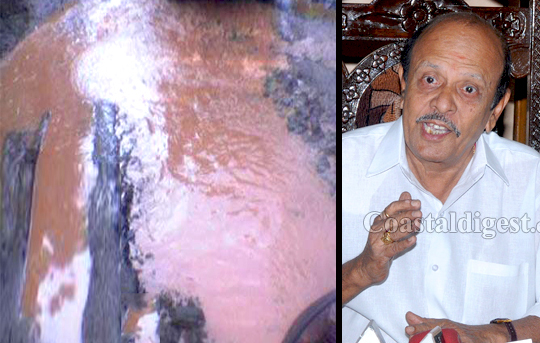Mangaluru: Oct 5: Holding giant vehicles operating to and from Mangalore Refinery and Petrochemicals Ltd responsible for the pathetic condition of the Suratkal-Kana-MRPL Road, Mangaluru Mayor Harinath has exhorted the subsidiary of ONGC to take up the repair works.
Speaking to media persons here, Mr Harinath said that he set a deadline of 20 days for MRPL. “The 4.5-km stretch from Suratkal to Kana towards MRPL is dilapidated due to the heavy motor vehicles that use the stretch. It will cost not less than Rs 3 crore, and it would be better the authorities concerned take up the works themselves,” he said.
He also said that the city corporation did not have enough fund to be spent on it. The company should use its corporate social responsibility fund for the purpose.
"I have written letters to MRPL management, Karnataka chief minister and Dakshina Kannada deputy commissioner in this regard," Harinath said, adding the under secretary to the CM has directed the DC to take suitable action in this regard. "I am hopeful that the DC will direct the MRPL authorities to take action," Harinath said.
He also warned that councillors of the Mangaluru city corporation would protest against the MRPL for not repairing the road. “Some organisations are planning to stage a protest over the issue on October 6. I, along with all the corporators, will join the protest, if the MRPL?authorities continue to remain nonchalant,” he said.
Also Read: Sorry, no money to repair Suratkal-Kana road: MRPL replies to MCC






Comments
Smart administration would do the required work done and send a bill to MRPL......and give them a deadline to pay or face closure consequences......
i request mayor to please do the road work soon, its a totally waste to wait for MRPL to do the work, they will file the case to sc and road work will be pending for almost 20years,
yenchi savuda road marre, bega sama manpule pokadijjandala yerda yerda nattunek, kass ejjida bele ejjandina employees deppule.
really a worst road
ora bega sama manpule MRPL dakulu road g kass paduna athete undu.
It's true that MRPL vehicles are doing most damages to this road and it's their social responsibility to keep this road safe and drive worthy..coz of MRPL, locals suffered lot..atleast this much favor MRPL should do..
Mayor Saab dont forget that this road is part of MANAGALORE corporation and locals pay tax to corporation,,so atleast you have to repair it temporarily until MRPL fix it for permanently. now its condition is pathetic...and need all elected members to push MRPL to do the needful immediately. Both our MP & MLA are in deep sleep..pour some water on them also so that let them wake up..
Good move Mr. Harinath, rather after 20 days don't let the vehicle going to and from of MRPL to use the road unless cleared by MRPL.
good move this plan should be implemented everywhere, and more thing i agree they used road more in that location so it got damaged, what about the normal two wheeler and all like time road tax u will receive and vehicle will not run that much whatever u charge is more than that, always common people suffer.
Add new comment